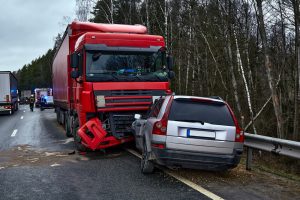Apr 01, 2022 | CHASENBOSCOLO
 Large commercial trucks are the primary way goods make their way across the country. Because the value of the contents of the truck’s containers is so high, trucking companies put a lot of money on the line when they send their drivers out onto America’s highways. To protect their interests in the event of an accident, the trucking companies almost invariably install a data-gathering “black box” in the truck. The data contained in this black box is often vital if the truck is involved in an accident.
Large commercial trucks are the primary way goods make their way across the country. Because the value of the contents of the truck’s containers is so high, trucking companies put a lot of money on the line when they send their drivers out onto America’s highways. To protect their interests in the event of an accident, the trucking companies almost invariably install a data-gathering “black box” in the truck. The data contained in this black box is often vital if the truck is involved in an accident.
What Is a Black Box?
“Black box” is a generic term that refers to various aspects of a commercial vehicle’s computerized systems. The systems’ functions are to monitor the status of the truck and the safety of the driver. Some black boxes are recording information all the time, but others begin recording data only when the system detects a crash.
Either way, the information the black box captures is important. In the absence of this data, it can be far more challenging to prove that the trucker was liable for the crash. Because of this, trucking companies tend to do everything they can to keep this data to themselves unless they are legally compelled to share it.
What Are the Different Types of Black Boxes?
A few different devices are classed as “black boxes.” A few of them are:
- Electronic Control Modules (ECMs) – These are the computerized systems that run modern truck engines. They tend to be made up of several computers and sensors whose function is to control and monitor various aspects of vehicle and engine performance. This can include transmission function, fuel injection timing, traction control, and anti-lock brake systems. ECMs will signal a “check engine” light to illuminate and will also generate fault codes that enable mechanics to diagnose and fix engine problems. The types of information they record include engine speed, temperature, emissions, tire pressure, transmission temperature, and battery information.
- Electronic Logging Devices (ELDs) – Required by the federal government since 2017, these are systems whose function is to monitor the driver’s service hours. Instead of using handwritten logs alone, ELDs can now record data about the function of the truck’s engine, movement, and distance traveled. The information ELDs capture can help determine whether the trucker was complying with the Hours of Service requirements that are set out by the Federal Motor Carrier Safety Administration (FMCSA).
- Event Data Recorders (EDRs) – This is what comes to mind when most people think about a commercial vehicle’s “black box.” It is a system that electronically monitors and records vehicle data from the moments that lead up to an “event.” They tend to capture things like sudden deceleration or braking events, airbag deployment, or seatbelt tensioner activation. When such an event occurs, EDRs maintain a recording of the truck’s speed, brake application, cruise control status, clutch engagement, and wheel turning.
Why Black Boxes are Crucial for Truck Accident Victims
 The black boxes of large commercial vehicles are vital because they tend to preserve the clearest evidence about what the trucker may have been doing or what malfunction may have occurred in the truck itself. The information can demonstrate that the driver failed to brake, was exceeding the speed limit, the exact time of the collision, and what the truck and its driver did after the crash.
The black boxes of large commercial vehicles are vital because they tend to preserve the clearest evidence about what the trucker may have been doing or what malfunction may have occurred in the truck itself. The information can demonstrate that the driver failed to brake, was exceeding the speed limit, the exact time of the collision, and what the truck and its driver did after the crash.
While the trucking company or their insurance provider may attempt to rewrite the narrative about what happened in the accident, the evidence in the black box is objective and is far more difficult to refute when you have made a claim.
The trucking company’s insurance carrier has a strong incentive to act aggressively on behalf of their clients in the hope that the victim will simply go away.
The data contained within a black box is the legal property of the trucking company, so they’re able to erase it. This would result in a serious loss of evidence about the accident that could help prove whether the trucker was at fault. Fortunately, an experienced truck accident attorney will know how to ensure that the trucking company preserves the black box’s data, which may well make a big difference in the outcome of your case.
Call an Experienced Truck Accident Lawyer Today
If you have been involved in an accident with a commercial truck in Virginia, Maryland, or the D.C. area, it is important to call a skilled lawyer as soon as possible before the trucking company has an opportunity to erase the vital information contained in the truck’s black box.
The Virginia truck accident lawyers of CHASENBOSCOLO are ready to use our experience and skill to make the company turn over the data so we can help you get the compensation you deserve. Call us now at (301) 220-0050 for a free consultation.





